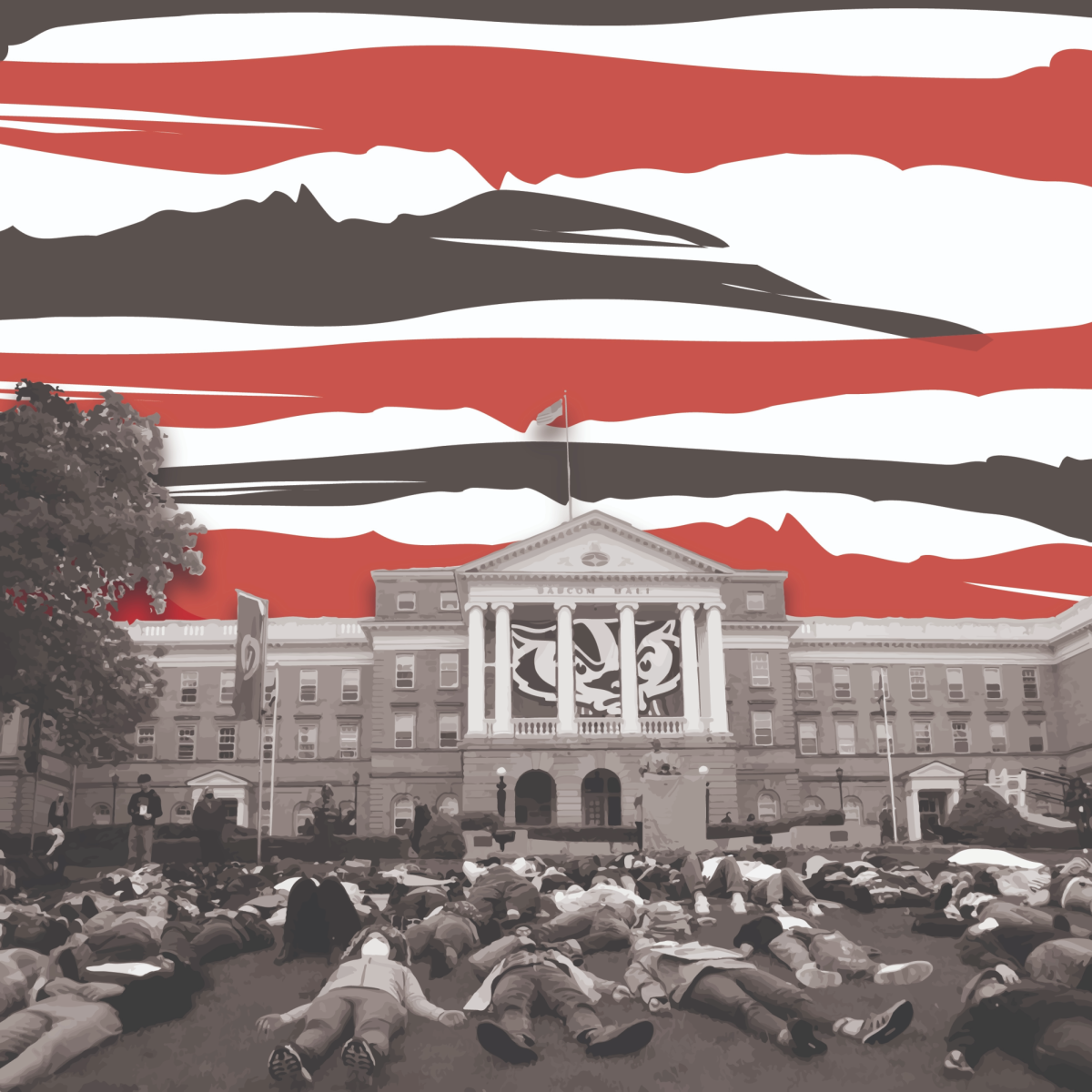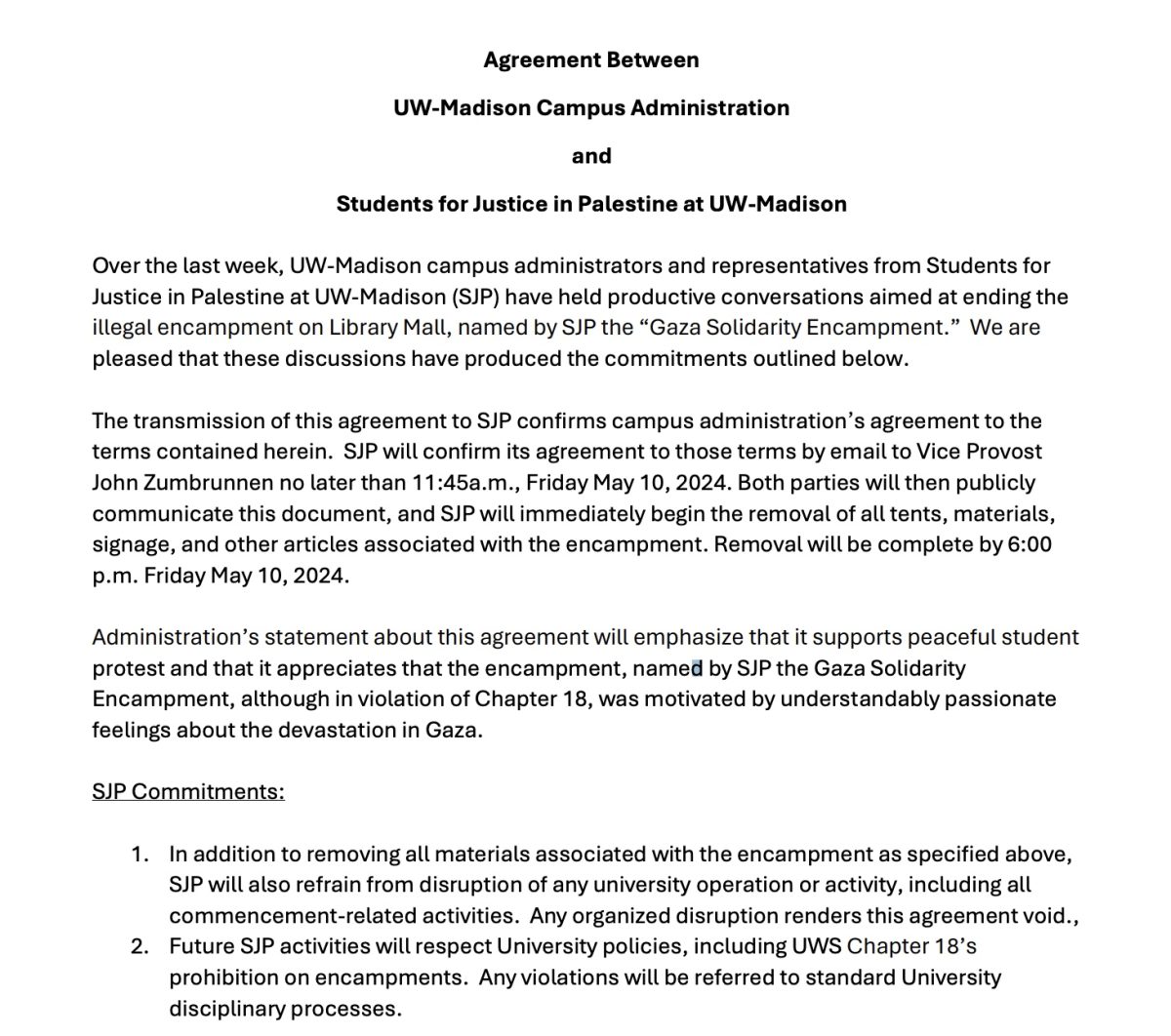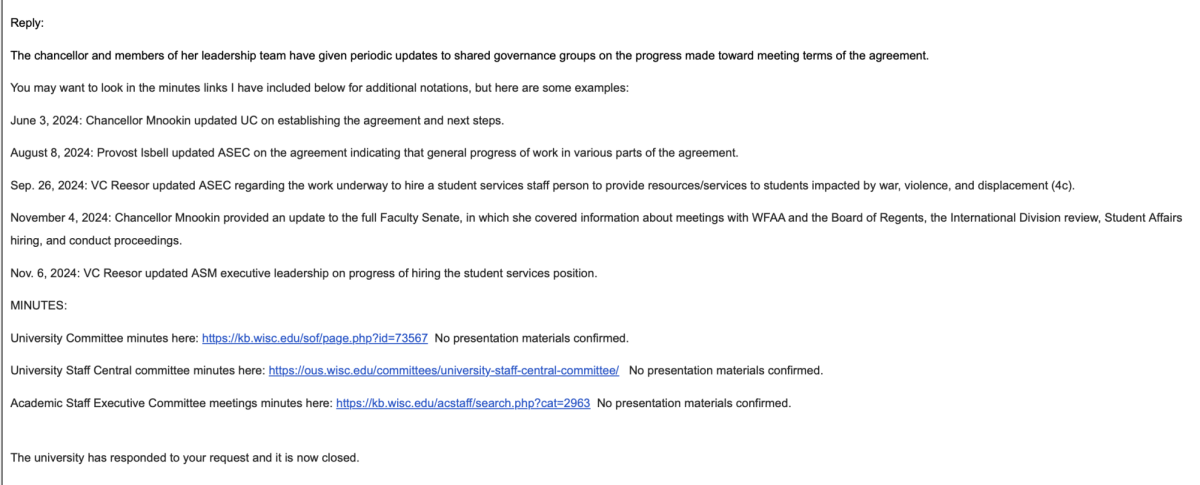Last Spring, the University of Wisconsin chapter of Students for Justice in Palestine led an encampment protest opposing the war in Gaza on Library Mall that lasted from April 29 to May 10, 2024, which UW temporarily disrupted using police force on its third day.
After 12 days, representatives from SJP and UW reached an agreement that required SJP to remove the encampment and commit to avoiding future disruptions in exchange for a series of concessions from UW.
Ten months later, UW has entered its first spring since the Library Mall encampment. Meanwhile, the conflict between Israel and Gaza has waned and waxed between periods of rest — during the Jan. 15, 2025, ceasefire — and continued violence.
Pro-Palestinian student activism at UW has faded since its Spring 2024 apex, though some campus demonstrations continue, most recently in support of Mahmoud Khalil, the Columbia student who was arrested March 8 for what officials described as leading activities aligned with Hamas, according to The New York Times. The crackdown on international students who engaged in university protests has accelerated since Khalil’s arrest.
During these events, deadlines have come and gone in the agreement between UW and SJP with little to no public communication from either party, leaving many students in the dark about where the terms of the agreement stand.
The Badger Herald checked on the progress of the agreement and found that though UW has taken some steps in the right direction, their approach has been highly guarded and only partially successful.
Is the agreement legally enforceable?
Before pulling out the yardstick and sizing up UW’s progression on the agreement’s terms, it is important to understand that it is not likely a legally enforceable contract, according to Marquette Law Professor and Associate Dean for Academic Affairs Nadelle Grossman.
There is no publicly accessible signature page, so it is not clear if someone with legal authority to bind UW to a contract even signed the agreement, nor does SJP, as a student organization, have the authority to enter a contract, Grossman said.
“They don’t really have any sort of legal authority,” Grossman said. “It’s just a student organization, you would need a legal person or entity, and they’re not.”
But the agreement does outline a series of exchanges between UW and SJP, satisfying an important element of a legally enforceable contract known as consideration. Even supposing the agreement did constitute a legally binding contract, and one party failed to perform, a court would have no way of assigning damages, Grossman said.
Despite the agreement likely having no legal basis, it still represents a moral commitment for both parties, according to Grossman.
“It’s not really just about you go to court to get a remedy like money or a court ordering, ‘you better perform this,’ but it’s just building a relationship,” Grossman said. “I almost see it like that.”
For SJP, the consequences for violating their end of the agreement are clear — disrupt any university operations and activities and risk rendering UW’s commitments void. For UW, the consequences for violating their terms would amount more to reputational damage than anything else.
It bears asking, then, has UW staked its honor on obligations they are unwilling or unable to fulfill? Based on interviews and public records obtained by The Badger Herald, UW has made significant efforts to realize some terms of the agreement. Other important concessions remain in limbo with no clear plan for implementation.
The Badger Herald also found, in one case, a determination to withhold from the campus community an otherwise successful element of the agreement.
Has SJP upheld its end of the agreement?
SJP’s commitment to not organize any disruptions to university operations or activities is the pillar on which this agreement rests. So far, SJP has maintained a good standing. Some students did protest the war in Gaza during commencement — after the encampment disbanded. But these quiet protests did not disrupt the proceedings, nor is there any indication they were organized by SJP.
SJP was placed on a 10-month disciplinary probation in early October for violating five RSO rules of conduct stemming from the encampment protest. UW has not indicated that any actions taken by SJP since the agreement was signed have broken the terms, according to UW News.
Where UW is meeting its obligations
UW has made good progress on at least two aspects of the agreement and has implemented steps toward realizing others. As per the agreement, UW pledged to facilitate a meeting between SJP representatives and “relevant decision-makers” from the Wisconsin Foundation and Alumni Association by July 1, 2024.
The meetings occurred later than the agreed upon date, but UW ultimately did facilitate exchanges between SJP and important decision makers at WFAA and the Universities of Wisconsin system.
According to The Cap Times, the delay was in part due to scheduling conflicts on the part of participating students.
On Sept. 16, 2024, five SJP representatives met with Board of Regents representatives, according to meeting minutes from a Nov. 4, 2024 Senate Faculty meeting. Moreover, SJP representatives plus a faculty and staff representative met with former WFAA CEO Mike Knetter and WFAA board chair Paul Shain on Nov. 4, 2024, according to the minutes and The Cap Times.
WFAA does not intend to disclose their investment portfolio or divest from any industries, according to The Cap Times. Divesting from all companies on the AFSC list was the first demand made by SJP at the beginning of the encampment protest, according to an SJP Instagram post.
UW administrators also agreed to request the Office of Student Conduct and Community Standards to consider the voluntary closure of the encampment as a favorable mitigating factor in the student disciplinary process.
During the Nov. 4, 2024 Faculty Senate meeting, Chancellor Jennifer Mnookin said UW had held true on this portion of the agreement. Last fall, two students faced investigations from UW for their alleged involvement in the encampment — the outcomes of which are unclear.
UW has also taken steps to add a new staff member to their Division of Student Affairs whose work will focus on students affected by war, violence and displacement. UW agreed to open the job listing by Aug. 1 and include student representation on the search committee, according to the agreement.
Since then, UW has twice offered the position but has not had an accepted offer and is reposting the position, according to records obtained by The Badger Herald.

Perhaps unsurprisingly, the areas of greatest progress in the agreement have been the most widely communicated with shared governance bodies. Both ASM and the University Committee received regular updates about these agreement items.
“ASM has met with dean of students Christina Olstaad and vice chancellor of student affairs Lori Reesor, where we’ve heard continued brief updates about mostly the position related to violence and displacement,” ASM chair Dominic Zappia said.
Zappia added ASM had not received regular updates on other aspects of the agreement including the invitation of a scholar from a Palestinian University to campus, the International Divsion’s fall 2024 review or UW’s commitment to build pathways for bringing additional students impacted by war, violence and displacement to campus.
Where UW is failing to meet its obligations
Information about other important aspects of the agreement remains inaccessible to the campus community. Public documents about the agreement and correspondence with people involved in the processes reveal that UW has fallen behind on numerous agreement items and has not communicated these lapses with shared governance bodies or the student body.
In a Nov. 11, 2024 University Committee meeting, Vice Chancellor for Student Affairs Lori Reesor indicated that all terms of the agreement had been met, following the posting of a student affairs position and the meeting between SJP and WFAA leaders.
“[Reesor] indicated that with the meeting held with the Wisconsin Foundation and Alumni Association that all terms of the agreement with Justice for Palestine that ended the encampment have been met,” the meeting minutes read.
It is important to recognize that minutes are summarized notes, not full transcripts of committee meetings.
The Badger Herald sent the above minutes to Reesor’s office and asked her to clarify whether it is still her position that all terms of the agreement have been met.
In response, Reesor’s office only pointed to the hiring of an additional staff member to their division of Student Affairs.
“Regarding the program coordinator position you referenced below, Student Affairs Office of Inclusion Education began recruitment last summer and are currently awaiting response on an extended offer,” the full statement reads.
Just a week prior to Reesor’s comments to the University Committee, Mnookin expressed in the Nov. 4, 2024 Faculty Senate Meeting that the International Division and Student Affairs were still making progress on ways to provide greater support to scholars and students impacted by war, violence, occupation and displacement. What these efforts amount to is unclear, but they likely refer to other agreement commitments.
For example, UW’s pledge to invite a Palestinian scholar to campus for the 2024-2026 school years, with possible extension — a commitment that has not yet amounted to a single invitation, according to records obtained by The Badger Herald.

“We appreciate the importance of this effort and remain committed to revisiting opportunities in the future,” the record reads.
But, as per the agreement, UW is not just obligated to explore opportunities but to invite a scholar for each of the next three years — the first deadline for which was the beginning of the 2024-2025 academic year.
UW provided even less information about efforts on building pathways to bring additional students impacted by war, violence and displacement to campus. The Badger Herald submitted a records request for an update on this term, to which UW responded by referring to several shared governance meetings, the minutes of which include no specific information about this commitment.
The records office pointed to an Aug 8, 2024 Academic Staff Executive Committee meeting in which they indicated Provost Charles Isbell provided an update on the agreement.
But, the meeting’s minutes make no reference of progress on the pathways or any other term of the agreement.
In response to a question about the lack of information in the meeting minutes, Assistant Director of Media Relations Greg Bump said in an email statement that UW’s progress on the agreement was discussed during the meeting.
“The minutes are not verbatim transcripts of the meetings,” Bump responded. “The topic was discussed by the provost at the meeting.”
UW has not responded to a follow-up question asking about what agreement items were discussed in the meeting.
The records office also pointed to a Sept. 26 ASEC meeting, during which only the staff position supporting students impacted by war, violence and displacement was discussed, according to the minutes. The records response also referred back to Mnookin’s November 4, 2024, comments to the Faculty Senate, and a November 6, 2024 update to ASM regarding the student affairs position, not the pathways.
Altogether, the meeting minutes provided by the public records office make no specific mention of the pathways.
Additionally, UW agreed to commission the International Division to conduct a review of campus resources available to students impacted by war, violence and displacement and share the review with the “campus community” by the end of the fall 2024 semester.
The mystery of the International Division Review
The review has been closely guarded and has yet to be shared with either the University Committee or ASM, three months after it was to be shared with the campus community, according to Zappia and Secretary of the Faculty Heather Daniels. The student body has also not had access to the review.
“The UC has not yet received the International Division’s review,” Daniels said in an email statement to The Badger Herald. “It is my understanding that it will be shared but that has been delayed in part by everything else that is happening with the federal transition.”
The Badger Herald obtained a copy of the review via records request.
The review itself found that UW has an abundance of resources to support students’ needs, but these resources are scattered across campus and are not always attuned to immigrant students or students impacted by war, violence and displacement. The review also found a need to promote greater cultural competence among staff who assist students on campus.
Finally, the review found that there is limited contact or connections between students who are impacted by war, violence and displacement and the broader community of faculty, staff and students across campus.
The review’s recommendations built on these findings, urging UW to improve coordination of student services, build cultural competence among faculty and staff and expand opportunities to learn about human rights and humanitarianism.
Looking forward
It has been nearly one year since the UW and SJP agreement was signed in response to the demands of a student protest movement, the consequences of which continue to play out across the nation. There have been no further encampment protests at UW or any other major universities in the U.S. in 2025, nor has SJP indicated any further intentions to stage another encampment this Spring.
The climate surrounding student protest at UW has undoubtedly changed since last Spring, notably with the institution of a new free speech policy at UW and the recent arrests of college students who participated in similar encampment protests.
In signing an agreement with SJP last Spring, UW may not have stuck its neck out on any legal guarantees, but it nevertheless undertook a bold commitment to the student body and broader campus community. Today, those commitments remain incomplete.
“It’s a betrayal of trust to the student leaders who came to the table,” Zappia said.
Whether or not UW pursues its promises to the fullest or allows them to lapse into obscurity may forever change its relationship with the student body and its ability to negotiate during future protests.







